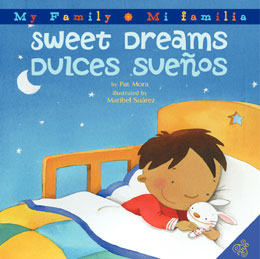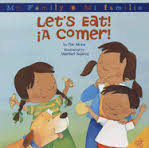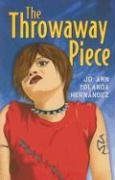When I’m with my papá, I can fly like an eagle, an águila.
I can climb alto, high, in a tree,
And I am the ganador, the winner, of many races.
When I am with my papá, I hear the best cuentos, stories,
and I give him the biggest abrazos, hugs.
A young boy and his papa may speak both Spanish and English, but the most important language they speak is the language of love. Here, Arthur Dorros portrays the close bond between father and son, with lush paintings by Rudy Gutierrez.



